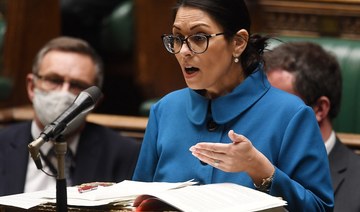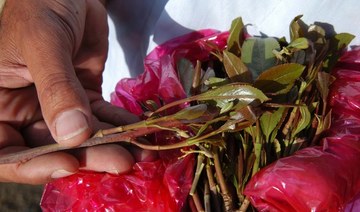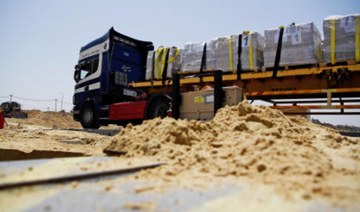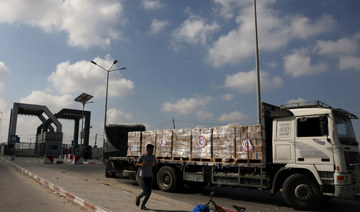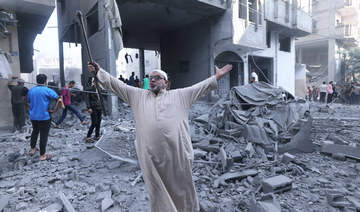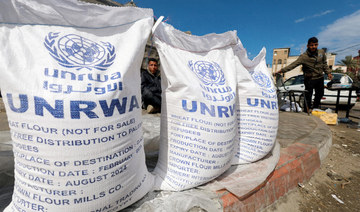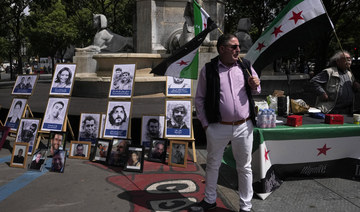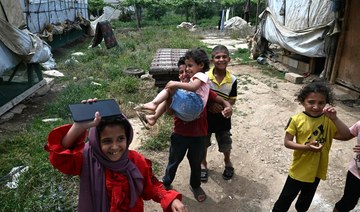PARIS: A growing number of cases are being brought in Europe, and especially Germany, against loyalists of Syrian President Bashar Assad’s regime on accusations of state-sponsored torture.
In the latest case, a court in the German city of Koblenz is set on Thursday to rule on the case of former Syrian intelligence agent, Anwar Raslan, who is accused of crimes against humanity, for which prosecutors are demanding a life sentence.
In February 2021, the court jailed a lower-ranking former Syrian intelligence agent, Eyad Al-Gharib, for being an accomplice to crimes against humanity in the world’s first prosecution over the abuses.
Here is a snapshot of the cases:
Germany has used the principle of universal jurisdiction, which allows a foreign country to prosecute crimes against humanity, including war crimes and genocide, regardless of where they were committed, after receiving complaints from Syrians who claim to have been tortured in regime jails.
In March 2017, seven Syrian torture survivors and a human rights group filed a criminal complaint in Germany against Syrian secret service officials.
Later that year nearly 27,000 photos taken by a former Syrian military photographer known as Caesar, who documented torture and death in regime jails, were also turned over to German courts, according to German rights group ECCHR.
In November 2017, the ECCHR announced that two new complaints for crimes against humanity and war crimes had been filed by 13 Syrians over alleged acts of torture.
Seven other Syrian men and women who claimed to have suffered or witnessed rape and sexual abuse in Assad’s detention centers also submitted a complaint to German prosecutors, the group revealed in June 2020.
They named nine senior government and air force intelligence officials, including top Syrian intelligence officer Jamil Hassan, already the subject of an international arrest notice.
The trial of a Syrian doctor accused of torture, murder and crimes against humanity is due to start in Frankfurt on January 19.
In September 2015, a Paris prosecutor opened a preliminary inquiry against Assad’s regime for crimes against humanity over allegations of abduction and torture.
The following July the family of a Syrian doctor who died in a government prison lodged a complaint in Paris over his torture and murder
Another French court opened an investigation in 2016 into the disappearance of Mazen Dabbagh and his son Patrick, two French-Syrian nationals who had been arrested in Syria three years earlier.
France issued its first international arrest notices for Syrian intelligence officials in 2018 for “complicity in acts of torture” related to the case as well as “complicity in crimes against humanity” and “complicity in war crimes.”
The warrants were for National Security Bureau director Ali Mamluk, Air Force Intelligence chief Jamil Hassan and Abdel Salam Mahmoud, who was in charge of the Damascus branch of the Air Force Intelligence investigative branch.
In April 2021, three NGOs that had lodged civil complaints managed to get a probe opened into chemical attacks in 2013 blamed on the Syrian government. The case, already filed in Germany, was lodged on behalf of victims of the 2013 attack and a 2017 attack using sarin gas.
In December 2021, a Franco-Syrian man was jailed, suspected of providing material to the Syrian army which could be used to make chemical weapons.
It is the first time that someone had been found charged in France with supporting Assad’s troops, judicial officials said.
In July 2017, a Spanish court rejected a complaint filed by a Spanish woman of Syrian origin against nine Syrian government officials over the forced detention, torture and alleged execution of her brother in 2013.
Legal proceedings have also been launched in Austria, Norway and Sweden which was in 2017 the first country to sentence a former soldier for war crimes.
In Sweden, four NGOs lodged a complaint in April 2021 against Assad and several top officials after two chemical attacks in 2013 and 2017.
In 2016, the United Nations set up its International, Impartial and Independent Mechanism, which is preparing war crimes charges against individuals over the Syrian conflict.
Since April 20 the body has been gathering evidence for use in possible future trials.
Syria’s Assad regime on trial in Europe
https://arab.news/yr7sf
Syria’s Assad regime on trial in Europe
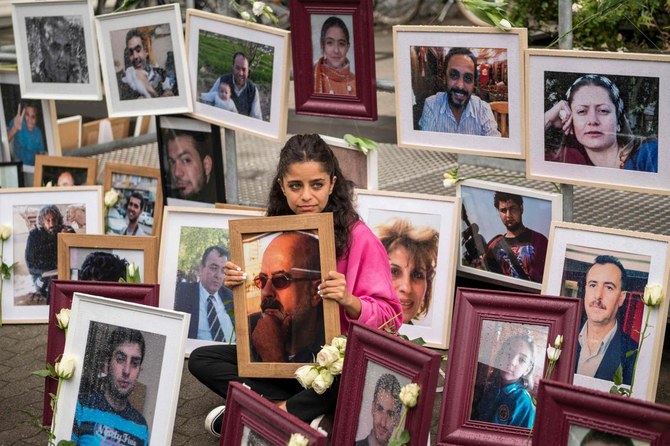
- Germany has used the principle of universal jurisdiction, which allows a foreign country to prosecute crimes against humanity
Israeli strike kills two Hezbollah fighters in Syria: monitor
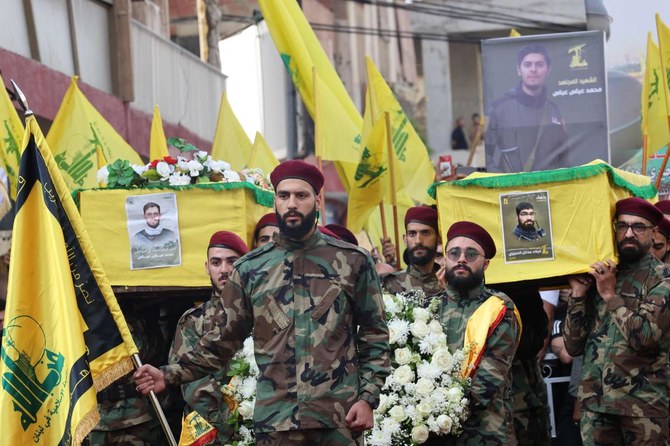
“An Israeli drone fired two missiles at a Hezbollah car and truck near the town of Qusayr in Homs province, as they were on their way to Al-Dabaa military airport, killing at least two Hezbollah fighters and wounding others,” said the Syrian Observatory for Human Rights.
G7 finance leaders to call on Israel to maintain Palestinian bank links
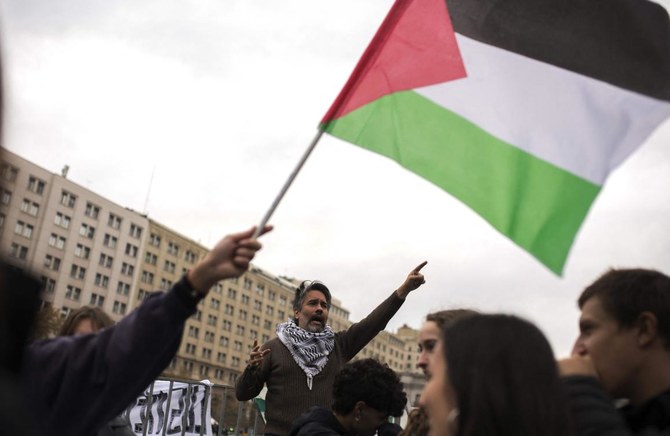
STRESA: G7 finance leaders will call on Israel to maintain correspondent banking links between Israeli and Palestinian banks to allow vital transactions, trade and services to continue, according to a draft joint statement seen by Reuters on Saturday.
The statement, to be released at the end of a Group of Seven finance ministers and central bank governors’ meeting in northern Italy, also calls for Israel “to release withheld clearance revenues to the Palestinian Authority, in view of its urgent fiscal needs.”
The statement echoes a warning on Thursday from US Treasury Secretary Janet Yellen, who said the failure to renew a soon-to-expire banking waiver would cut off a critical lifeline for the Palestinian territories amid a devastating conflict in Gaza.
“We call on Israel to take the necessary measures to ensure that correspondent banking services between Israeli and Palestinian banks remain in place, so that vital financial transactions and critical trade and services continue,” the draft statement said.
The G7 finance leaders also called for the removal or relaxation of other measures “that have negatively impacted commerce to avoid further exacerbating the economic situation in the West Bank.”
Egypt agrees to send aid trucks through Israeli crossing to Gaza but impact is unclear
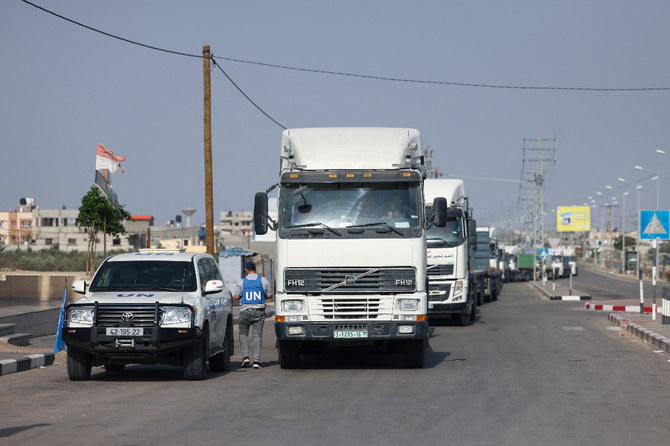
- Israeli troops seized the Rafah crossing into Egypt, which has been inoperative since
- The UN says it cannot reach Kerem Shalom to pick up aid as it enters because fighting in the area makes it too dangerous
TEL AVIV, Israel: Egypt said Friday it has agreed to send United Nations humanitarian aid trucks through Israel’s main crossing into Gaza, but it was unclear if they will be able to enter the territory as fighting raged in the southern city of Rafah amid Israel’s escalating offensive there.
Gaza’s humanitarian crisis has spiraled as the UN and other aid agencies say the entry of food and other supplies to them has plunged dramatically since Israel’s Rafah offensive began more than two weeks ago. On Friday, the top UN court — the International Court of Justice — ordered Israel to halt the Rafah offensive, though Israel is unlikely to comply.
At the heart of the problem lie the two main crossings through which around 300 trucks of aid a day had been flowing into Gaza before the offensive began.
Israeli troops seized the Rafah crossing into Egypt, which has been inoperative since. The nearby Kerem Shalom crossing between Israel and Gaza has remained open, and Israel says it has been sending hundreds of trucks a day into it. But while commercial trucks have successfully crossed, the UN says it cannot reach Kerem Shalom to pick up aid as it enters because fighting in the area makes it too dangerous.
As a result, the UN says it has received only 143 trucks from the crossing in the past 19 days. Hundreds of truckloads have been sitting on the Gaza side of the crossing unretrieved, according to Israeli officials, who say UN manpower limitations are to blame. UN and other aid agencies had to rely on the far smaller number of trucks entering daily from a single crossing in northern Gaza and via a US-built pier bringing supplies by sea.
Humanitarian groups are scrambling to get food to Palestinians as some 900,000 people flee Rafah, scattering across central and southern Gaza. Aid workers warn Gaza is near famine. UNRWA, the main UN agency in the humanitarian effort, had to halt food distribution in Rafah city because it had run out of supplies.
The Egyptian announcement appeared to resolve a political obstacle on one side of the border.
Israel says it has kept the Rafah crossing open and asked Egypt to coordinate with it on sending aid convoys through it. Egypt refused, fearing the Israeli hold will remain permanent, and demanded Palestinians be put back in charge of the facility. The White House has been pressing Egypt to resume the flow of trucks.
In a phone call with US President Joe Biden on Friday, Egyptian President Abdel Fattah El-Sisi agreed to allow trucks carrying humanitarian aid and fuel to go to the Kerem Shalom crossing until a solution is found for the Rafah crossing, El-Sisi’s office said in a statement.
But it remained unclear whether the UN will be able to access additional trucks coming from Egypt.
UNRWA did not immediately reply to requests for comment. In a post on social media outlet X on Thursday, it said, “We could resume (food distribution in Rafah) tomorrow if the crossing reopened & we were provided with safe routes.”
Mercy Corps, an aid group operating in Gaza, said in a statement Friday that the offensive had caused the “functional closure … of the two main lifelines” of aid and “has brought the humanitarian system to its knees.”
“If dramatic changes do not occur, including opening all border crossings to safely surge aid into these areas, we fear that a wave of secondary mortality will result, with people succumbing to the combination of hunger, lack of clean water and sanitation, and the spread of disease in areas where there is little medical care,” it said.
Fighting appeared to escalate in Rafah. Bombardment intensified Friday in eastern parts of the city, near Kerem Shalom, but shelling was also taking place in central, southern and western districts closer to the Rafah crossing, witnesses said.
Israeli leaders have said they must uproot Hamas fighters from Rafah to complete the destruction of the group after its Oct. 7 attack.
Hamas-led militants killed around 1,200 people, mainly civilians, and abducted around 250 others in the Oct. 7 attack. Around half of those hostages have since been freed, most in swaps for Palestinian prisoners held by Israel during a weeklong ceasefire in November.
Israel’s campaign of bombardment and offensives in Gaza has killed more than 35,800 Palestinians and wounded more than 80,200, the Gaza Health Ministry said Friday. Its count does not differentiate between civilians and combatants.
The Israeli military said its troops overnight found the bodies of three people killed in the Oct. 7 attack and subsequently taken into Gaza and counted among the hostages.
The bodies of Hanan Yablonka, Michel Nisenbaum, and Orion Hernandez Radoux were found in the Jabalia refugee camp in northern Gaza, where Israeli troops have been fighting for the past week with Hamas militants, the military said.
The announcement comes less than a week after the army said it found in the same area the bodies of three other Israeli hostages also killed on Oct. 7.
Nisenbaum, 59, was a Brazilian-Israeli from the southern city of Sderot. He was killed in his car as he went to get his 4-year-old granddaughter from a site near Gaza that came under attack by the militants.
Oryon Hernandez Radoux, 30, and Yablonka, 42, a father of two, were both killed as they tried to escape the Nova music festival, where the attackers killed hundreds of people. Hernandez Radoux had been attending the festival with his partner, German-Israeli Shani Louk, whose body was among those found by the army earlier.
Israel says around 100 hostages are still captive in Gaza, along with the bodies of at least 39 more, while 17 bodies of hostages have been recovered.
The group representing the families of the hostages said the bodies had been returned to their families for burial. Israeli Prime Minister Benjamin Netanyahu said the country had a duty to do everything to return those abducted, both those killed and those who are alive.
French President Emmanuel Macron gave condolences to the family of Hernández-Radoux, a French-Mexican citizen, saying France remains committed to releasing the hostages.
CIA Director Bill Burns was meeting in Paris on Friday with Israeli and Qatari officials in informal talks aimed at getting hostage and ceasefire negotiations back on track, a US official said, speaking on condition of anonymity to discuss the sensitive discussions. Burns is in close contact with Egyptian officials, who like the Qataris have acted as mediators with Hamas, the US official said.
Ceasefire talks ground to a halt at the beginning of the month after a major push by the US and other mediators to secure a deal, in hopes of averting a planned Israeli invasion of the southern city of Rafah. The talks were stymied by a central sticking point: Hamas demands guarantees that the war will end and Israeli troops will withdraw from Gaza completely in return for a release of all the hostages, a demand Israel rejects.
Italy to resume funding for UN agency for Palestinian refugees
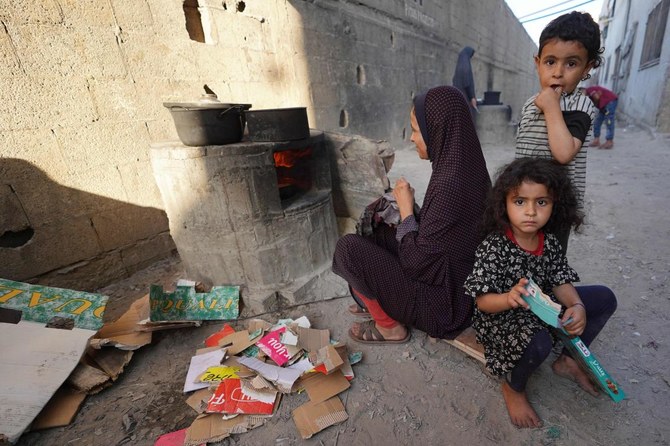
- UNRWA, which coordinates nearly all aid to Gaza, has been in crisis after Israel’s allegations
ROME: Italian Foreign Minister Antonio Tajani on Saturday announced Rome would restore funding for the UN agency for Palestinian refugees as he met with Palestinian Prime Minister Mohammed Mustafa.
“Italy has decided to resume financing specific projects intended for assistance to Palestinian refugees, but only after rigorous controls that guarantee that not even a penny risks ending up supporting terrorism,” he said.
Tajani said he had informed the visiting premier “that the government has arranged new funding for the Palestinian population, for a total of 35 million euros.”
“Of this, five million will be allocated to UNRWA,” he said in a statement, with the remaining 30 million euros allocated to Italy’s “Food for Gaza” initiative in coordination with UN aid agencies.
UNRWA, which coordinates nearly all aid to Gaza, has been in crisis since January, when Israel accused about a dozen of its 13,000 Gaza employees of being involved in the October attack on Israel by Hamas.
That led many nations, including top donor the United States, to abruptly suspend funding to the agency, threatening its efforts to deliver aid in Gaza, although several have since resumed payments.
An independent review of UNRWA, led by French former foreign minister Catherine Colonna, found some “neutrality-related issues” but said Israel had yet to provide evidence for its leading allegations.
Created in 1949, the agency employs around 30,000 people in the Palestinian territories, Jordan, Lebanon and Syria.
Mustafa was later due to meet with Italian Prime Minister Giorgia Meloni.
Car blast kills one in Syrian capital: state media
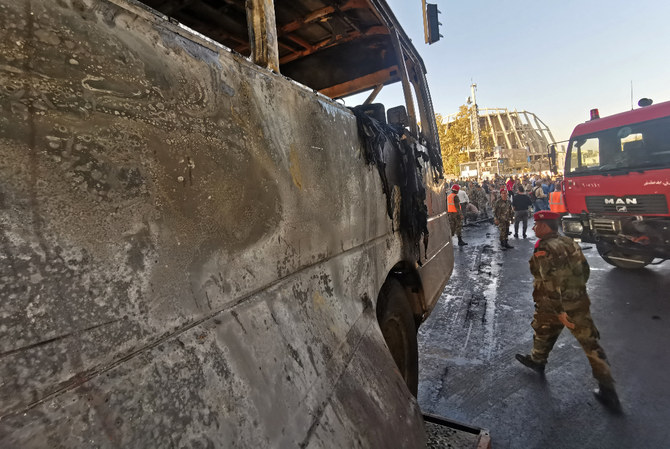
- Three vehicles caught fire in the area
DAMASCUS: A car explosion killed one person in Damascus on Saturday, the official Syrian news agency SANA reported, without identifying the victim.
Security incidents, including blasts targeting military and civilian vehicles, occur intermittently in the capital of war-ravaged Syria.
Quoting a police official, SANA said “one person was killed when an explosive device exploded in their car in the Mazzeh district.” It did not provide any other details.
The Syrian Observatory for Human Rights, a Britain-based war monitor with a network of sources on the ground, said three vehicles caught fire in the area.
The explosion comes against a backdrop of heightened regional tensions, including the war between Israel and the Iran-backed Palestinian militant group Hamas in the Gaza Strip.
Last month, an explosive device went off in a car in Mazzeh, an upscale neighborhood of Damascus, without causing any casualties, SANA reported at the time.
Israel has launched hundreds of air strikes in Syria since civil war broke out in 2011, targeting Iran-backed forces including Lebanon’s Hezbollah movement as well as Syrian army positions.



